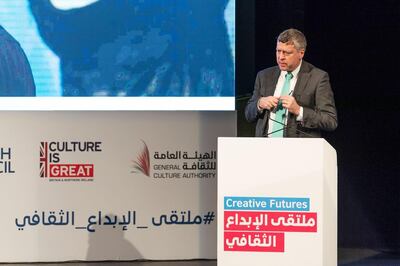Of the 33 million people in Saudi Arabia, nearly 60 per cent are under the age of 30. This is an enormous reservoir of youthful enthusiasm – and many of these young people are ready to capitalise on the significant changes taking place across the country, particularly in the arts.
Last April, the first cinema opened in the country; a Saudi Film Council has been set up, in part to support young filmmakers; concerts are being staged; and contemporary art galleries are popping up in all the major cities. These developments are, to some extent, a response to Saudi Vision 2030, the government’s plan to diversify the economy and reduce its reliance on oil.
“The doors are open,” said Rehana Mughal, the British Council’s senior programme manager for culture and sport in the Gulf. “And the conversations are more open, bringing in diverse voices.”
The untapped potential of the Saudi market
This felt like the right moment, then, for the General Culture Authority in Saudi Arabia to stage the first Creative Futures Forum in Riyadh, in partnership with the British Council, the United Kingdom's international organisation for cultural relations and educational opportunities. More than 250 experts, policymakers and students gathered over two days earlier this month, at the King Fahad Cultural Centre to discuss how the creative economies can continue to thrive both in Britain and across the Gulf. There were sessions on how to support careers in the arts, why a creative curriculum is so important, and different ways to nurture a diverse film sector.

There is perhaps the perception that creative industries and the arts are an indulgence. But the numbers tell a different story. In the United Kingdom, the creative sector, which has grown by 50 per cent since 2010, contributes £100 billion (Dh476bn) to the economy. It is hoped that a buoyant creative sector will have a similar impact on the Gulf economies. "The untapped potential of the market is clearly there," said Ciaran Devane, chief executive of the British Council. "The opportunity in the region to build that infrastructure and to create jobs is perhaps uniquely strong."
A push for more arts
This process has been under way in the UAE for years. Landmark projects, such as Louvre Abu Dhabi, Qasr Al Hosn and Alserkal Avenue in Dubai have boosted the economy through tourism and the creation of jobs. All eyes are now on Saudi Arabia, where there is massive investment in new museums, as well as a determination to build upon what is already there. "
There is a long-standing tradition of creativity that exists in rural areas and the Saudi Commission for Tourism and National Heritage wants to replenish that craft sector and help these people to develop their businesses," said Mughal. "Saudi Arabia is taking a really strategic view, not just concentrating on the main cities, but actually taking the country on as a whole."
Over the past few weeks, for example, Andrea Bocelli and Chinese pianist Lang Lang performed sold-out shows at Al Ula, home to a Unesco World Heritage Site. The arts are undoubtedly flourishing away from the major cities.
But while the economic impact of the creative sector has been impressive in the UK and the Gulf, it is a mistake to assess the arts on numbers alone. As Dr Patricia Kaszynska, a research fellow at University of the Arts London, pointed out in her session at the Creative Futures Forum, a film such as Marvel's Black Panther, which was shown in Saudi Arabia, generates billions of dollars at the box office, but its true value might be as a source of inspiration for a generation of black teenagers. "We need to understand the difference culture makes before we ask secondary, albeit important, questions about how much money it makes," said Kaszynska.
It is difficult to measure what effect the creative sector has on the areas of empathy or compassion. We know it is significant. British economist Robert Peston captured this sentiment when he said: “If we could prove conclusively that the economic impact of the arts was zero, would we prevent children from learning to draw?”
The effect on Saudi Arabian youth
Speaking to some young Saudi Arabian people at the conference, it is clear that they, too, understand that the arts have an intrinsic value; the economic benefits occur organically; and it is the explosion of creativity that is most exciting. "People have so much energy," said one Saudi woman. "I teach in college and the students say to me, 'I want to do this and that.' We are in a very good place and time."
This explosion in the arts has also softened gender divisions in Saudi Arabia. "Gender is not a matter of fact when you are speaking to somebody [about the arts]," the woman, 30, said. "You are speaking to the mind, to the idea. Now we have more minds to connect to."
Maisah Sobaihi, a theatre director who spoke at the Creative Futures Forum, plans to stage an all-female version of Othello. "The work that we're seeing more of is very exploratory," said Mughal. "People are feeling more confident to share it."
In December, meanwhile, men and women danced together at an Enrique Iglesias concert in Jeddah. Saudi Vision 2030 might ostensibly be about diversifying the economy but the societal effects have been extraordinary. "Like any change, it will take some time," said Devane. "But the excitement for me is seeing that change happen in reality. It's not theory. It's about seeing this is really possible."







